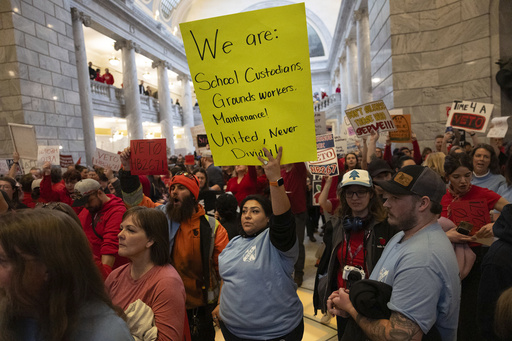
SALT LAKE CITY — On Friday, Utah’s Republican governor took a significant step by enacting a law that prohibits collective bargaining for various public sector unions, a move that has been characterized by experts as one of the most stringent labor laws in the nation. This legislative decision has drawn substantial backlash from union members, who have voiced their opposition vehemently.
Starting July 1, unions representing teachers, firefighters, police officers, transit workers, and other public employees in Utah will be barred from negotiating on behalf of their members regarding better wages and working conditions. Governor Spencer Cox announced his approval of the bill on Friday evening after a week filled with demonstrations outside his office, where thousands of union members from both public and private sectors urged him to veto the legislation. The Republican-majority Legislature had narrowly passed the bill last week, after its sponsors chose to abandon a compromise proposal that would have prevented an outright ban on collective bargaining.
Expressing disappointment in the legislative process, Cox acknowledged that the potential compromise, which had gained some support from stakeholders, ultimately did not materialize. The bill’s passage did not achieve a veto-proof margin, indicating that had the governor decided against it, Republican legislators would have needed additional support to override his veto.
John Logan, a labor expert from San Francisco State University, stated that with this new law, Utah joins North Carolina and South Carolina among the states imposing the most stringent limitations on public sector unions. Many teachers, often the most active users of collective bargaining rights, perceive this law as a strategic move by Republicans to diminish the influence of teachers’ unions and promote their own educational policies.
Supporters of the law within the Republican Party defended it by arguing that it facilitates direct engagement between employers and all employees, circumventing the need for union representation. The Utah Education Association, the state’s largest union for public education workers, slammed Governor Cox for disregarding the numerous voices calling for a veto. The union is contemplating the possibility of launching a ballot referendum aimed at overturning the law, though they recognize that such an initiative would require significant financial resources.
In their statement, the union declared, “Despite overwhelming opposition, Governor Spencer Cox and the Legislature ignored the voices of thousands. This is a blatant attack on public employees and our right to advocate for the success of our profession and students.”
Cox’s decision comes against the backdrop of broader political movements, with former President Donald Trump attempting to diminish the power of the U.S. Education Department by cutting funding and encouraging resignations among its staff. Additionally, on the same day, the governor signed another bill that restricts transgender college students from residing in dormitories that align with their gender identity.
According to this new measure, students at public colleges and universities in Utah can only access or occupy gender-specific spaces, including dorm buildings, locker rooms, or restrooms, that correspond to their sex assigned at birth. This law marks the first explicit transgender restriction targeted at university housing in the state, although some existing legislation in various states holds broader implications regarding restroom access that could affect dormitory living arrangements.

